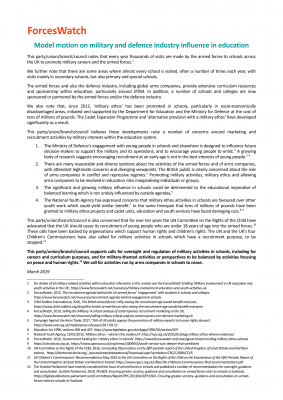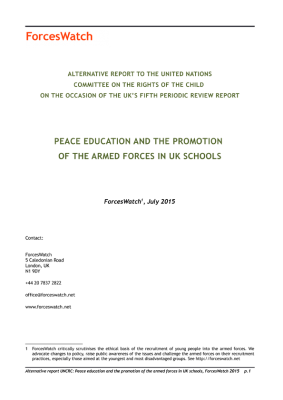legislation & conventions
legislation & conventions
Model motion on military and defence industry influence in education

For discussion in union or party branches and councils etc. The motion calls for oversight and regulation of military activities in schools, including for careers and curriculum purposes, and for military-themed activities or perspectives to be balanced by activities focusing on peace and human rights. It also calls for activities run by arms companies in schools to cease.
Liberty Soldier’s Rights campaign
The human rights organisation Liberty campaign on Soldier's Rights and have addressed a number of substantial concerns with the military justice system in recent years.
Submission to the Human Rights and the Scottish Parliament inquiry

This submission made by ForcesWatch and Quakers in Scotland to the Scottish Parliament's human rights inquiry details our concerns around the need for regulation and transparent accountability of military activities in schools, the lack of education about peace and human rights, and the continued recruitment of children into the UK armed forces.
UN observations on UK and childrens’ rights
The Committee on the Rights of the Child recently reviewed the UK's position on implementing the articles and protocols of the Convention on the Rights of the Child. They made a number of recommendations relating to the armed forces recruitment of under-18s and the military's activities in schools.
Soldiers at 16: Sifting fact from fiction

Published by Child Soldiers International, this short and accessible booklet addresses questions often raised about under-18s in the armed forces, presenting the facts - based on extensive research - rather than the fiction. Also contains very useful quotes and statistics. Great when talking to your MP or for those thinking of enlisting!
Peace education and the promotion of the armed forces in UK schools

This report highlights that peace education is not being promoted in schools. This is counter to the recommendations made by the United Nations Committee on the Rights of the Child to the UK Government that peace education should be part of the curriculum. This raises concerns particularly with the increased promotion of the military within schools through the Department for Education's 'military ethos' programme and free military-related learning resources, and as the armed forces continue to conduct a substantial 'youth engagement' programme.
UK’s compliance with the UN Convention on the Rights of the Child: Report from the Joint Committee on Human Rights
In advance of the United Nations Committee on the Rights of the Child's consideration of how the UK complies with the Convention on the Rights of the Child (during autumn 2015), the UK Parliament's Joint Committee on Human Rights has published a short report outlining areas of concern. The report states: Again, we hope that our successor committee will have an opportunity to scrutinise the issue of children serving in the armed forces in the light of the UN Committee's concluding ovservations which will be delivered in 2016.
International Standards on Conscientious Objection to Military Service
Published by the Quaker United Nations Office in November 2011, this booklet reflects recent changes in international law and practice that indicates that recognition of conscientious objection to military service as a human right is now stronger than ever.
The Armed Forces (Terms of Service) (Amendment) Regulations 2011
New legislation (from 22 July 2011) which grants under 18s the right to leave after a 'cooling off' period. Prior to this, discharge of 'unhappy minors' was at the discretion of the commanding officer.
United Nations Convention on the Rights of the Child and the Optional Protocol on the Involvement of Children in Armed Conflict
The UK remains the only EU country to recruit 16 year olds into the military and one of very few EU countries to recruit 17 year olds. The UK has signed the Optional Protocol to the Convention on the Rights of the Child on the Involvement of Children in Armed Conflict yet there is evidence that the UK continues to target children from vulnerable groups and that safeguards to protect under-18s are not effective.
